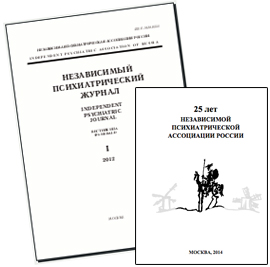Abstracts of №4, 2016
The Independent Psychiatric Association of Russia activity in 2014-2016
Yu.S. Savenko
The Summary report at the XV Meeting of the IPA of Russia presents IPAR’s activity in 2014-2016 in accordance with its three priorities: professional one, legal one and organizational one. The report has demonstrated that the Association sticks to its principles and goals in contrast to the governmental course directed to centralization of psychiatric services.
Keywords: IPA of Russia in 2014-2016
Theoretical and philosophical foundations of psychiatry: the key problems
Yu.S. Savenko
Domain-specific report at the XV IPAR Meeting substantiates Karl Popper’s critical rationalism ( Imre Lakatos, Hans Albert) coming after the phenomenological method in redaction of Karl Jaspers and 16 laws of interrelation of 4 ontological strata of Nicolai Hartmann’s critical ontology as the most productive philosophical basis of psychiatry and in psychotherapy – centration of meaning in the concepts of Alfred Adler and Viktor Frankl. It provides evidence to support the point of view that the integration of biological, psychological and social characteristics is implemented by the very process of individualization. The main method of psychiatry is the strict intellectual processing, since a psychiatrist, and to the greatest extent, a psychotherapist is, according to Jaspers, inevitably a philosopher.
Keywords: philosophical foundations of psychiatry, theoretical fundamentals of psychiatry.
Experience of self-learning Jaspers’ philosophical and theoretical foundations of psychiatry by a psychiatrist
I.M.Bekker (Naberezhnye Chelny)
Presentation by a psychiatrist of his own experience of mastering and extending his knowledge of General Psychopathology by Jaspers and phenomenological method, ascending to the sources (Sextus Empiricus, Descartes and Husserl) and demonstrating how it works in case of delusion and “ habitat of the soul.”
Keywords: General Psychopathology by K. Jaspers
The citizen’s right to familiarize with the original medical records, reflecting the state of his mental health
Yu.N.Argunova
The question of the right of a citizen (patient), including suffering from mental disorders, directly acquainted with the medical records, reflecting the state of his health. The provisions of the framework law on health, the branch of the law on psychiatric care and the order of the Russian Ministry of Health June on 29, 2016 № 425n are analyzed. The legal position of the Constitutional Court of the Russian Federation, international law’s norms and examples of judicial practice are given.
Keywords: the right of patient to get acquainted with his medical records
The problem of diminished responsibility in the Republic of Belarus: methodology of expert conclusions formulation
S.A.Igumnov, A.N.Nestsiarovich (Minsk, Belarus)
The article provides the review of the current approach to diminished responsibility, including the major definitions, legislative acts and forms of its practical realization in the Republic of Belarus. The authors also provide the recommended algorithms of proper methodology of expert conclusion formulation basing on the analysis of contribution of legislative and medical criteria of diminished responsibility in certain situations.
Keywords: legislation of Belarus, diminished responsibility, expert conclusions.
On the subject of “Polemic remarks about contemporary psychiatry”
Yu.I.Polischuk
Prof.E.V. Bobrov’s paper published in IPJ #3, 2016, is discussed. Having agreed on the decline of the prophylactic trend in Russian psychiatry, bureaucratization of professional education and absence of intelligible managerial policy in psychiatry, the author underlies purely verbal and declaratory character of the modern bio-psycho-social attitude which leads to the loss of its essence. He challenges pessimism in respect to the perspective of biological research in psychiatry and pathogenetic treatment, and above all, sharply criticizes the idea of replacement of the clinical attitude by the informational notions and technologies.
Keywords: biopsychosocial attitude, informational attitude in psychiatry
Some intuitive-phenomenological observations (from clinical and non-clinical experience)
B.V. Voronkov (St. Petersburg)
The author strongly disagrees with prof. E.V. Bobrov’s thesis( IPJ #3, 2016) that intuitive phenomenological description should be replaced by the operational criteria and demonstrates possibilities of the phenomenological method in the diagnosis of mental disorders of various origins.
Keywords: intuitive-phenomenological description, operational criteria in psychiatry
An anthology of writings by Russian psychiatrists
Yu.S.Savenko
The author notices the biased selection demonstrated by the compilers of the collection, absence of the eight important names: P. I. Jacobi, V.P. Serbsky, A.N. Bernstein, N.P. Brukhansky, L.M. Rosenstein, M.O. Gurovich, A.S. Shmarian and also a striking negligence: absence of the year and place of publication of writings included.
Keywords: method compiling anthology
Psychotherapy: trends and challenges of integration
V.E. Kagan (Berlin)
The current status and the ways of integration of psychotherapy as a phenomenon of culture at the present stage of civilizational change are discussed.
Keywords: psychotherapy, integration, existential, cultural history.
“Spiritual Fortress-Garden” (Therapy of creative self-expression (M.E.Burno) for chronic depressive suicidal patients
M.E.Burno
The author describes one of the options of Therapy of creative self-expression (M.E.Burno) that can prevent suicide in severe chronic depressive suicidal patients.
Keywords: suicidal depression, therapy of creative self-expression (M.E.Burno).
History of Preobrazhenskaya Hospital in Moscow
N.N. Bazhenov. A letter to V.I. Guerrier. 1904.
This is the first publication from the archive. It contains some unexpected information regarding not only Preobrazhenskaya Hospital but also one of the prominent Russian psychiatrists N.V. Bazhenov (until 1904).
Keywords: history of Preobrazhenskaya hospital in Moscow, N.N. Bazhenov



